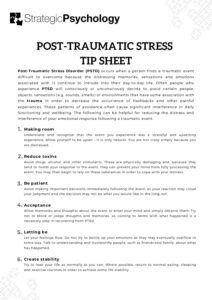
Post-Traumatic Stress Tip Sheet
854 KB
Post-Traumatic Stress Disorder (PSTD) occurs when a person nds a traumatic event di cult to overcome because the distressing memories, sensations and emotions associated with it continue to intrude into their day-to-day life. Often people who experience PTSD will consciously or unconsciously decide to avoid certain people, objects, sensations (e.g. sounds, smells) or environments that have some association with the trauma in order to decrease the occurrence of flashbacks and other painful experiences. These patterns of avoidance often cause signi cant interference in daily functioning and wellbeing.
The following can be helpful for reducing the distress and interference of your emotional response following a traumatic event.
- Making room – Understand and recognise that the event you experience was a stressful and upsetting experience. Allow yourself to be upset – it is only natural. You are not crazy simply because you are distressed.
- Reduce toxins – Avoid drugs, alcohol and other stimulants. These are physically damaging and, because they tend to numb your response to the event, they can prevent your mind from fully processing the event. You may then begin to rely on these substances in order to cope with your distress.
- Be patient – Avoid making important decisions immediately following the event, as your reaction may cloud your judgment and the decision may not be what you would like in the long run.
- Acceptance – Allow memories and thoughts about the event to enter your mind and simply observe them. Try not to block or judge thoughts and memories, as coming to terms with what happened is a necessary step in recovering from PTSD.
- Letting be – Do not try to bottle up your emotions as they may eventually overflow in some way. Talk to understanding and trustworthy people, such as friends and family, about what has happened.
- Create stability – Try to lead your life as normally as you can. Where possible, return to normal eating, sleeping and exercise routines in order to achieve some life stability.
- Facing life – Do not avoid settings or activities that you previously enjoyed, simply because they remind you of an event. This can assist in desensitising you to the distress, and allow your mind and body to learn that, in the vast majority of instances, these situations and activities are actually safe and need not be avoided.
- Rest – Allow yourself to rest when you are feeling tired. A good time to do this is possibly after exercising, as this will help you to regain your strength and avoid feeling run-down. Distress often uses a great deal of energy, so you may feel more exhausted than usually following a traumatic event. It is important to give yourself ample opportunity to recover.
- Connect with others – Communicate with family and friends about your experiences. This enables others to understand that at times you may need to rest, need some time alone, need to talk to someone, etc.
- Relax, rest and breathe – Take time to practice relaxation and breathing. Possibly engage in progressive muscle relaxation, or do things that are calming and enjoyable, such as gardening or listening to music. By doing this you can allow your body to adjust and relax.
- Understanding your experience – If the trauma also reminds you of other stressful life events and you become excessively distressed and try to recognise the reasons why these past memories have come up and time.
- Talking openly – Talk to someone about them or write them down. Often this can enable you to appropriately process what happened.
- Getting help – If you are distressed about the duration of your post-event distress, seek help from a psychologist or GP. Trained professionals will be able to help you identify the factors that have contributed to your distress, and recommend strategies to assist you in improving your levels of functioning and overall wellbeing.